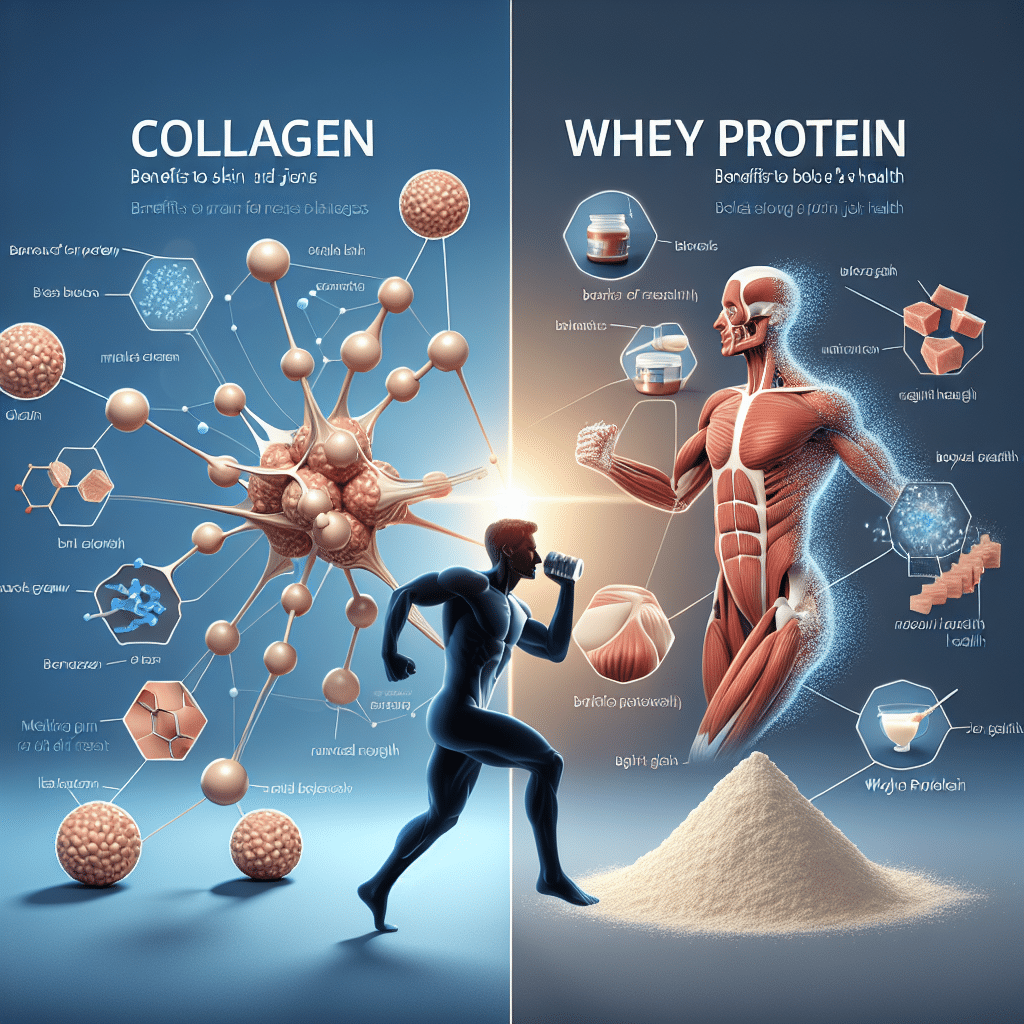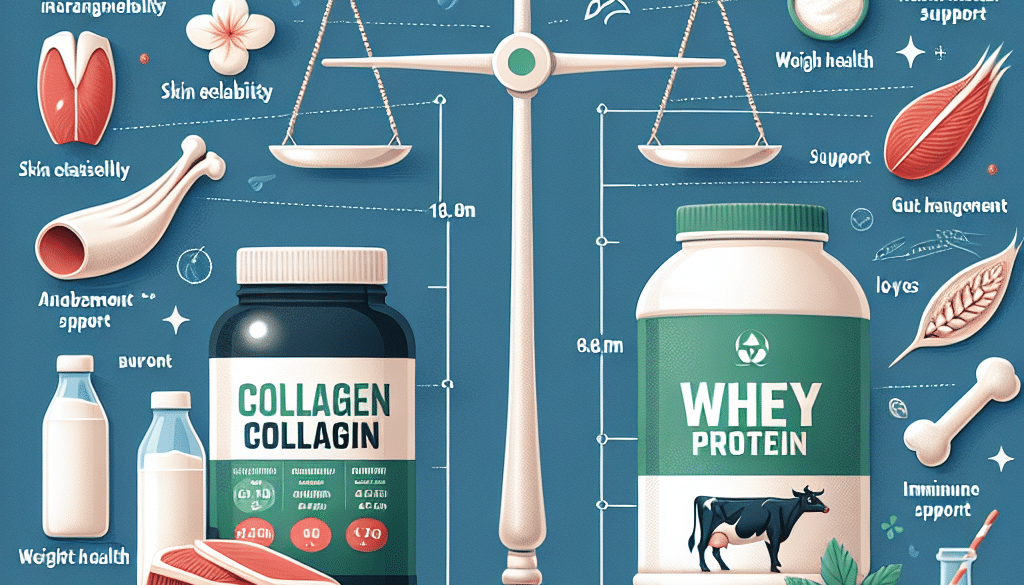Collagen vs Whey Protein: The Ultimate Comparison
-
Table of Contents
- Collagen vs Whey Protein: An In-Depth Nutritional Showdown
- Understanding Collagen Protein
- Whey Protein Explained
- Comparing Collagen and Whey Protein
- Nutritional Profile
- Digestibility and Absorption
- Impact on Muscle Growth
- Health Benefits Beyond Protein
- Use Cases and Applications
- Choosing Between Collagen and Whey Protein
- Case Studies and Research
- Conclusion: Collagen vs Whey Protein Showdown
- Discover ETChem’s Premium Protein Products
Collagen vs Whey Protein: An In-Depth Nutritional Showdown

When it comes to protein supplements, the debate between collagen and whey is a hot topic among athletes, bodybuilders, and health enthusiasts. Both have their unique benefits and can be used for different health and fitness goals. This article will delve into the ultimate comparison of collagen versus whey protein, helping you decide which might be the best fit for your dietary needs.
Understanding Collagen Protein
Collagen is the most abundant protein in the human body, playing a crucial role in maintaining the structure and integrity of skin, bones, muscles, tendons, and ligaments. As we age, our body’s natural production of collagen decreases, which can lead to common signs of aging such as wrinkles, sagging skin, and joint pain.
- Types of Collagen: There are several types of collagen, with Type I, II, and III being the most common. Each type supports different parts of the body.
- Sources: Collagen supplements are typically derived from bovine, porcine, or marine sources.
- Benefits: Collagen supplementation can support skin elasticity, joint health, and may aid in the healing process of the body’s tissues.
Whey Protein Explained
Whey protein is a by-product of cheese production and is a complete protein, meaning it contains all nine essential amino acids necessary for dietary needs. It’s well-known for its role in muscle building and repair, making it a favorite among athletes.
- Types of Whey: Whey protein comes in three main forms: concentrate, isolate, and hydrolysate, each varying in protein content and absorption rate.
- Benefits: Whey protein promotes muscle growth, aids in recovery after exercise, and may help with weight loss by increasing satiety.
Comparing Collagen and Whey Protein
Nutritional Profile
Whey protein is rich in branched-chain amino acids (BCAAs), which are crucial for muscle protein synthesis. Collagen, on the other hand, is high in amino acids like glycine, proline, and hydroxyproline, which support connective tissue.
Digestibility and Absorption
Both collagen and whey protein are easily digestible, but whey protein isolate and hydrolysate are known for their rapid absorption rates, making them ideal for post-workout recovery.
Impact on Muscle Growth
Whey protein has been extensively studied for its role in muscle growth and is considered superior for this purpose due to its high BCAA content. Collagen may not be as effective for muscle building but is beneficial for overall joint and tissue support.
Health Benefits Beyond Protein
Collagen has been associated with improved skin health and a reduction in joint pain. Whey protein has been linked to improved immune function due to its high content of immunoglobulins and lactoferrin.
Use Cases and Applications
Collagen is often used in beauty products and supplements aimed at improving skin and joint health. Whey protein is commonly found in sports nutrition products designed to support muscle growth and recovery.
Choosing Between Collagen and Whey Protein
Your choice between collagen and whey protein should be based on your specific health goals. If you’re looking to improve skin health or support your joints, collagen might be the better option. For muscle building and recovery, whey protein is likely more effective.
Case Studies and Research
Several studies have highlighted the benefits of both collagen and whey protein. For instance, research has shown that collagen supplements can significantly reduce wrinkles and improve skin elasticity. In contrast, whey protein has been proven to enhance muscle protein synthesis and support weight loss efforts.
Conclusion: Collagen vs Whey Protein Showdown
In conclusion, both collagen and whey protein have their place in a balanced diet and supplement regimen. Collagen is your go-to for skin and joint health, while whey protein is the champion for muscle growth and recovery. Consider your personal health goals and dietary needs when choosing between these two powerhouse proteins.
Discover ETChem’s Premium Protein Products
If you’re looking for high-quality protein supplements, ETChem offers a range of collagen and whey protein products that cater to various needs. Whether you’re aiming to improve your skin health with marine collagen or boost your workout recovery with whey protein, ETChem has you covered.
About ETChem:
ETChem, a reputable Chinese Collagen factory manufacturer and supplier, is renowned for producing, stocking, exporting, and delivering the highest quality collagens. They include marine collagen, fish collagen, bovine collagen, chicken collagen, type I collagen, type II collagen and type III collagen etc. Their offerings, characterized by a neutral taste, instant solubility attributes, cater to a diverse range of industries. They serve nutraceutical, pharmaceutical, cosmeceutical, veterinary, as well as food and beverage finished product distributors, traders, and manufacturers across Europe, USA, Canada, Australia, Thailand, Japan, Korea, Brazil, and Chile, among others.
ETChem specialization includes exporting and delivering tailor-made collagen powder and finished collagen nutritional supplements. Their extensive product range covers sectors like Food and Beverage, Sports Nutrition, Weight Management, Dietary Supplements, Health and Wellness Products, ensuring comprehensive solutions to meet all your protein needs.
As a trusted company by leading global food and beverage brands and Fortune 500 companies, ETChem reinforces China’s reputation in the global arena. For more information or to sample their products, please contact them and email karen(at)et-chem.com today.

